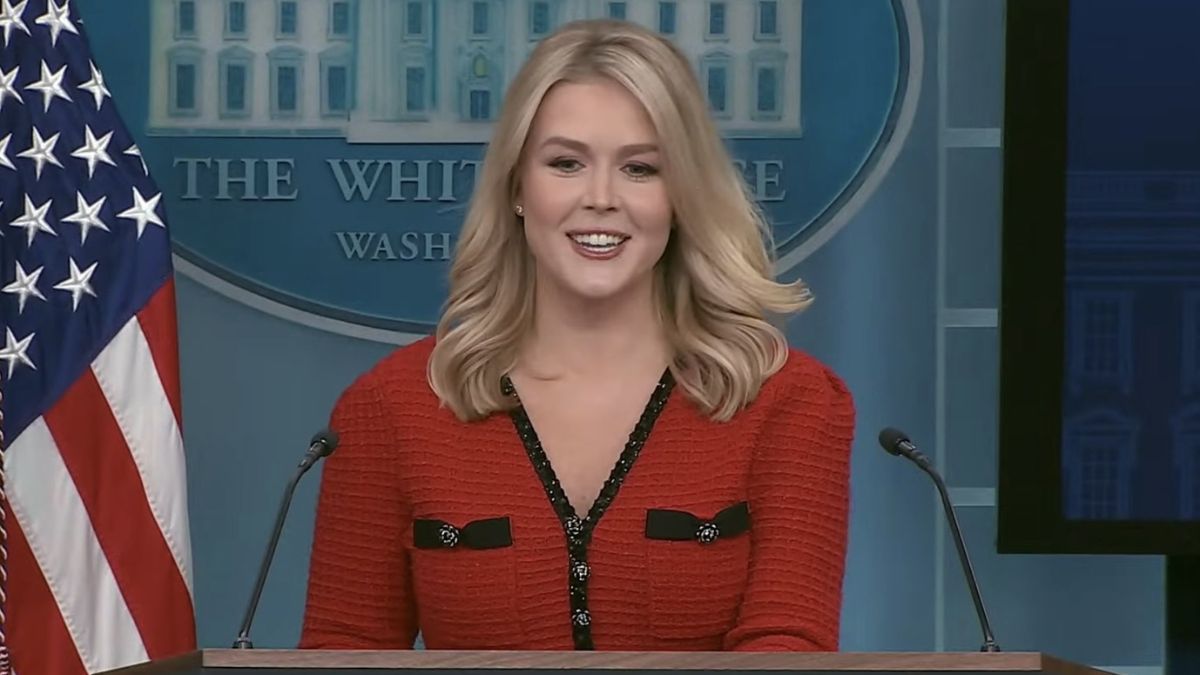White House Press Secretary Karoline Leavitt is under fire for wearing a dress that social media users claim was ‘made in China.’
The controversy comes at a time when the United States and China are locked in an escalating trade dispute , with new tariffs and countermeasures being introduced by both sides.
Adding to the strain, China has also issued a fresh “risk alert” for its citizens planning to visit the United States due to rising tensions between the two countries.
ALSO READ | Amid US-China tariff war, why Xi Jinping’s Southeast Asia tour matters
Amid the tensions, the youngest White House press secretary in US history has become a target of social media.
In this report, we look at what the controversy is about, how people on social media are reacting, and a brief overview of the tensions between the United States and China
The row over Karoline Leavitt’s ‘Made in China’ dress
The White House Press Secretary has been accused of using the US-China tariff row for “business”, while continuing to rely on Chinese-made goods in practice.
During a recent White House briefing, Karoline Leavitt appeared in a red and black lace dress that quickly drew attention on social media.
Users pointed out its resemblance to a design available on several Chinese e-commerce platforms, though it remains unconfirmed whether the dress was made in China.
Zhang Zhisheng, who serves as the current Consul General of the People’s Republic of China in Denpasar, Indonesia, and former CG in Zanzibar, Tanzania also criticised Leavitt on social media platform X for wearing a dress allegedly made from Chinese lace.
Impact Shorts
More Shorts“Accusing China is business. Buying China is life. The beautiful lace on the dress was recognised by an employee of a Chinese company as its product,” he wrote.
He posted an image of Leavitt’s outfit alongside screenshots from the Chinese platform Weibo, where users claimed to recognise the lace pattern.
One said it came from a factory in Mabu, China, where they are employed.
The response on social media was mixed: some argued the dress could be a replica, while others criticised Leavitt for relying on Chinese products while speaking against them.
A user commented: “The clothes are all made in China, and we shout boycott China every day.”
Another added: “The lace on the collar and placket of this dress was woven in Mabu Town. It was dyed by our factory.”
What social media users are saying
Several social media users have criticised Leavitt for wearing what appears to be Chinese-made clothing while publicly bashing China.
“Leavitt slams Made in China while rocking a Chinese-made dress, hypocrisy much? Tariffs hit hard, but her wardrobe says she’s all for it. Classic politician move: blame China, but keep the cheap goods,” one user wrote.
Another wrote, “How does Karoline Leavitt manage the crushing irony of slamming ‘Made in China’ while strutting in a gorgeous Chinese-made lace dress at the White House podium?”
Commenters also pointed out that items branded with Donald Trump’s “Make America Great Again” slogan, often referred to as Maga, are said to be manufactured and obtained from China.
Chinese news outlet China 24 said that such examples “highlighted a paradox in China-US relations under the current Trump administration”.
The outlet further claimed that Chinese manufacturers have benefitted from Trump’s campaign orders and shared a video clip from his 2016 rally, where Trump told supporters to “buy American and hire American.”
Meanwhile, some users defended Leavitt, suggesting that the item sold on the Chinese website might simply be a replica.
“Chinese people are notorious for bootleg clothes. It’s more likely that they copied a luxury brand’s jacket,” one user wrote.
Another posted, “Everything China makes is stolen from other people. Her dress is an original.”
A third user wrote, “Fake news. She’s wearing the French original whereas the advert shows a Chinese copy. It’s funny indeed, but the spin of the tweet is dishonest.”
US-China tensions
The US-China tariff war has escalated, with both sides imposing huge duties on goods worth billions of dollars.
Amid fears of a global market downturn, Trump last week temporarily suspended tariffs on most countries for 90 days, stating that nations were ready to enter talks for improved trade terms.
China, however, has rejected any negotiations, declaring it would “fight to the end” in the tariff standoff. In response, Trump raised tariffs on Chinese imports to 145 per cent.
The hike was initially pegged at 125 per cent on Wednesday last week but did not account for an additional 20 per cent duty linked to China’s involvement in fentanyl production.
In retaliation, China increased its own tariffs on American goods to 125 percent, as tensions deepen between the world’s two largest economies.
Barring a few exceptions, trade in goods between the two countries has largely come to a halt. Beijing has also begun tightening restrictions on services and has advised its citizens against travelling to the US, while also discussing a possible ban on imports of American films.
)